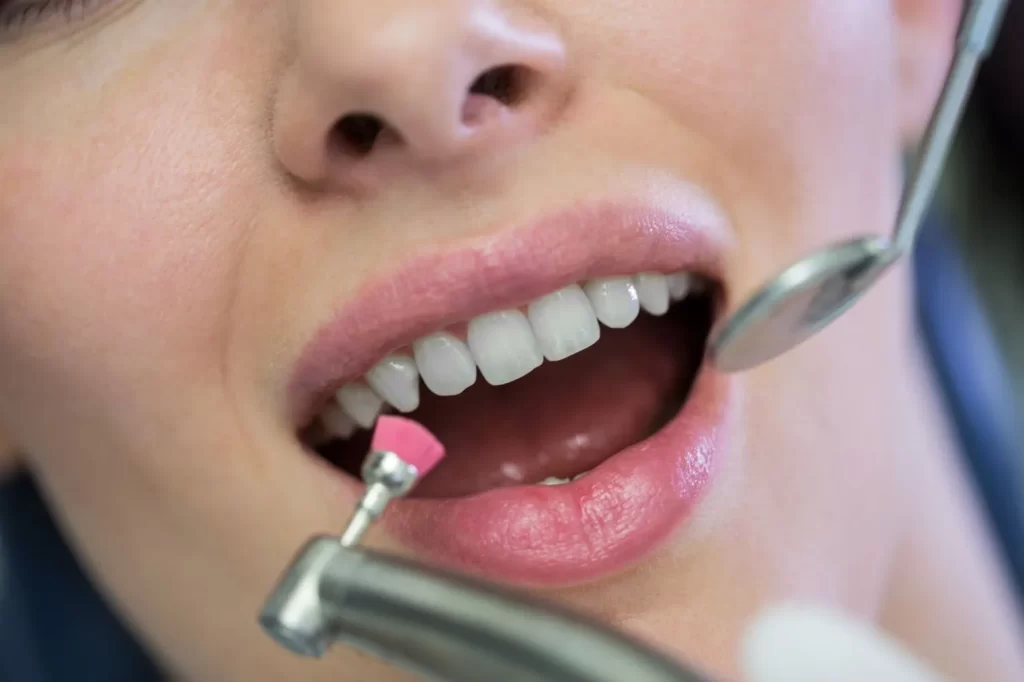
Scaling and polishing treatments are done to remove hardened plaque (or calculus) from your teeth. Plaque and calculus are the main source of gum diseases. Removing them is necessary because they provide the environment for bacteria to thrive around the gums and cause inflammation, recession, loose teeth and even tooth loss, bad breath, and teeth discolouration. Scaling and polishing not only removes plaque and calculus, but also removes stains on the teeth caused by tea, coffee, and tobacco, and provides a smooth surface that does not let bacteria adhere to it.
Who Needs Scaling and polishing?
You need scaling and polishing of your teeth if you suffer from gingivitis (a mild form of gum disease) or periodontitis (a severe form of gum disease). However, it is recommended that everyone should get their teeth scaled and polished once a year.
What Are the Benefits of Scaling and Polishing?
- Prevents gum diseases, tooth decay, cavities, and bad breath
- Removes stains on teeth caused by tea, coffee, and tobacco
- Improves overall oral health
What Is the Procedure for Scaling and Polishing ?
First, we conduct a complete examination of your oral cavity to check the extent of the build-up of plaque and calculus. Our experienced endodontic consultant will then start your treatment.
Scaling involves the following steps:
- Depending on your sensitivity, local anesthesia may be used to numb the area.
- An ultrasonic scaler will be used for scaling. It is a tool that uses vibrations to loosen and remove calculus above and below the gum line. For smaller areas or stubborn plaque, manual tools like curettes may be used to scrape it away.
- A continuous water spray is used to flush away debris and keep your oral cavity clean. A suction tube is also used to remove any excess water and debris from your mouth.
Polishing involves the following steps:
- A prophylactic toothpaste with mild abrasive properties is applied to your teeth.
- A small, rotating rubber brush attached to a handpiece is used to polish the tooth surfaces, removing surface stains and smoothing them.
- After this, your dentist will ask you to rinse your mouth to remove any remaining paste or debris. They may also apply a topical fluoride treatment to strengthen the tooth enamel.
What Should You Do Before and After the Procedure ?
There are many advantages of Scaling and Polishing like
Any pain, bleeding, or irritation after the treatment will subside within four hours. Experiencing mild sensitivity for the next 24 to 48 hours is normal; however, avoid eating foods or drinking beverages of extreme temperatures. Additionally, avoid eating or drinking anything for two hours after your appointment.
Why Choose Dr. Nilanjana’s Dental Care?
At Dr. Nilanjana’s Dental Care, we offer a comprehensive and caring environment to carry out quality treatments. Your procedure will be done by our highly qualified and experienced endodontist, using state-of-the-art equipment.
Contact us today to book your appointment. The cost of the treatment will be finalised after your initial consultation.
FAQ’s
As scaling and polishing are done on a superficial surface, this procedure is painless. Sometimes, patients may feel mild discomfort or sensitivity after scaling, which may last for a few days.
Scaling and polishing removes all the superficial plaque and calculus that causes discolouration of the tooth surface. Teeth whitening removes intrinsic as well as extrinsic stains that can’t be removed by scaling and polishing.
As scaling removes the hard-bound calculus encircling the tooth, they may seem more mobile than before, but in reality, scaling will help in preventing further mobility and tooth loss. Any mobility after scaling subsides as the gums return to their normal position. Additionally, as chunks of calculus are often stuck between teeth, removing them may lend the appearance of gaps.
Any sensitivity experienced after scaling is normal and temporary. Until it subsides, avoid consuming hot and cold food and beverages.